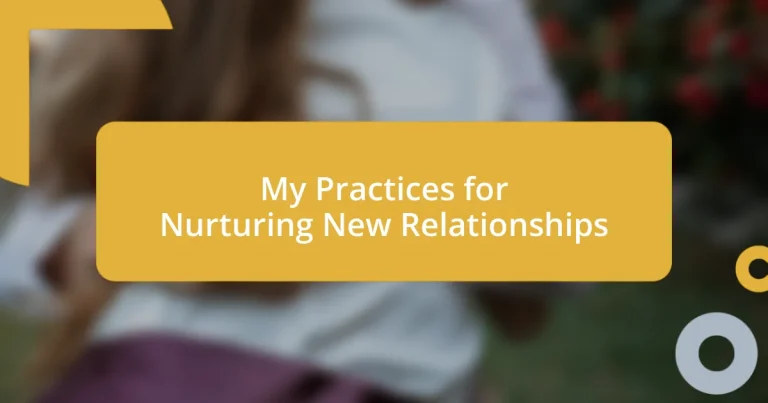Key takeaways:
- Foundational elements of a relationship include shared values, trust, and effective communication to foster deeper connections.
- Active listening and vulnerability are crucial practices that enhance empathy, understanding, and stronger bonds in relationships.
- Engaging in shared activities and maintaining regular check-ins can significantly nurture and maintain the health of long-term relationships.
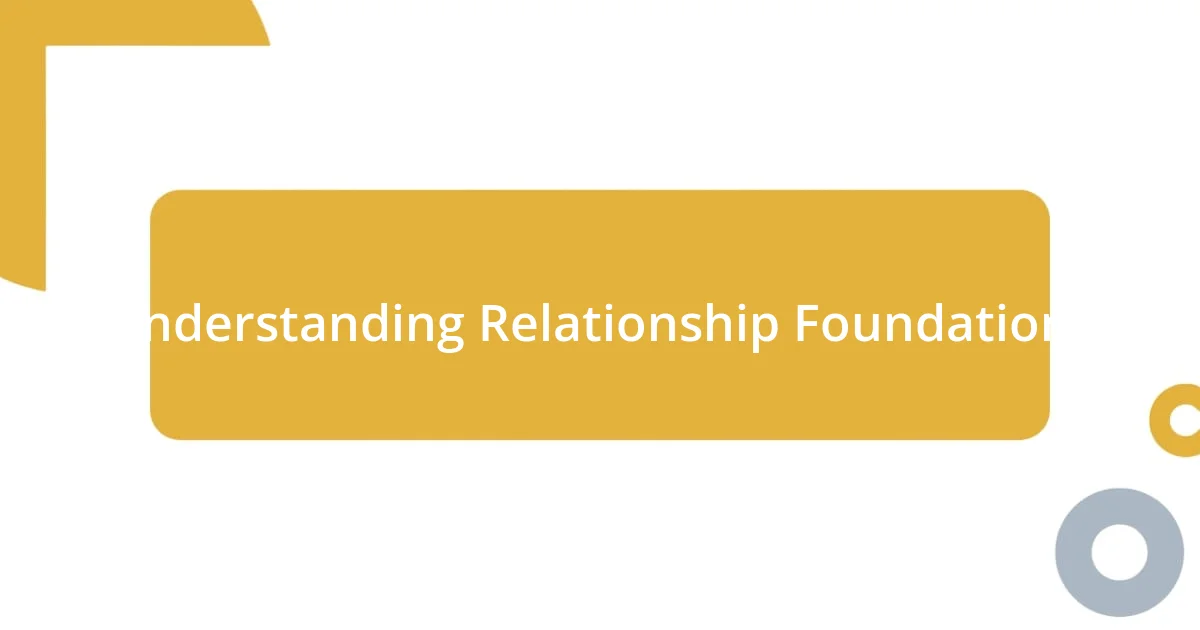
Understanding Relationship Foundations
Understanding the foundations of a relationship is crucial for nurturing it effectively. I once jumped into a friendship without really knowing the other person’s values and goals. It was eye-opening when I realized our misaligned beliefs caused friction, reminding me that shared core values are essential for any strong connection.
Trust is another cornerstone in building relationships, and I remember a time when I had a falling out with a close friend because I didn’t open up about my feelings. Reflecting on that experience, I understand that vulnerability can feel daunting, but it’s vital. How can we expect others to trust us if we aren’t willing to be honest about our own emotions?
Finally, the role of effective communication cannot be overstated. There was a period when I assumed my partner could read my mind, only to discover that miscommunication led to misunderstandings. Have you ever felt that way? This experience taught me that actively sharing thoughts and feelings fosters deeper connections and reinforces relationship foundations.
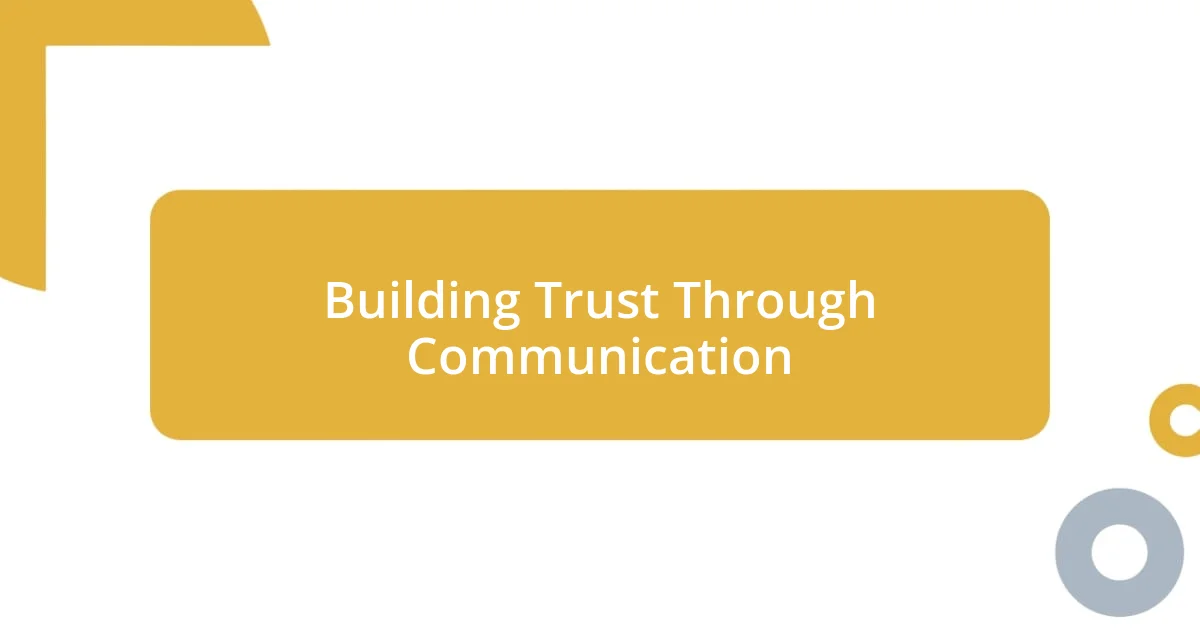
Building Trust Through Communication
Building trust through communication is essential, and I’ve learned this firsthand. I once found myself in a tricky situation with a colleague when I thought sharing my feedback might create tension. To my surprise, after I expressed my thoughts openly, it sparked an honest dialogue that strengthened our professional bond. It demonstrated that transparency isn’t just about honesty; it’s also about creating a safe space where both parties feel valued and heard.
To cultivate trust through effective communication, I’ve discovered several practices that can be incredibly impactful:
- Practice Active Listening: I make a point to really listen when someone speaks, showing them that their words matter.
- Be Vulnerable: Sharing my experiences, even the uncomfortable ones, helps others feel more connected.
- Ask Questions: Engaging with open-ended questions invites deeper discussions and shows genuine interest.
- Clarify Misunderstandings: I’ve learned to address confusion right away to avoid festering doubts.
- Be Consistent: Showing up and being reliable in my communication fosters a sense of security.
These practices not only help in building trust but also in nurturing the connections that matter most to me.
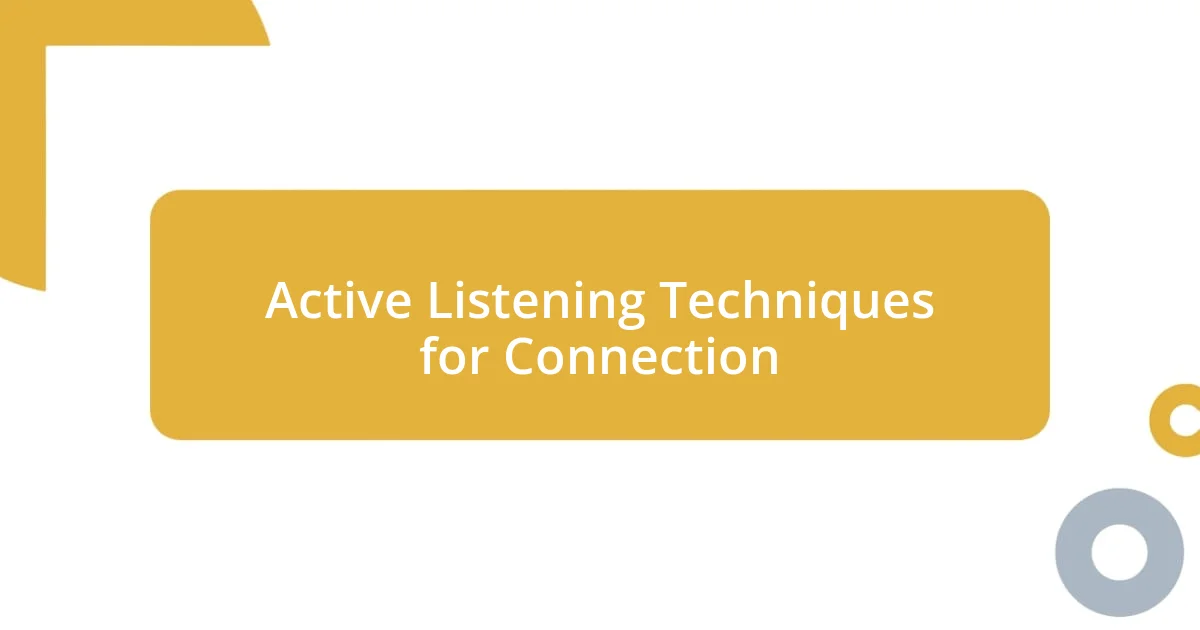
Active Listening Techniques for Connection
Active listening is a transformative skill that I’ve embraced over the years. I remember a heartfelt conversation with a friend going through a tough time; I put aside my phone and distractions, focusing entirely on what they had to say. It was remarkable how much closer we felt afterward, simply because I was present and genuinely invested in their feelings. Do you ever notice how a simple gesture, like nodding or leaning in, can convey empathy? I find that these actions create an inviting space for others to share more freely.
Another active listening technique I’ve found effective is summarizing what the other person has said. During a family disagreement, I practiced this by repeating back their main points, which not only demonstrated my understanding but also calmed the situation. This reflection often encourages people to express themselves even further, reinforcing that you truly care about their perspective. Have you tried this approach? The difference it makes in enhancing connections is profound and has been a game changer for me.
I also think about the power of silence when active listening. I can recall a moment when an acquaintance began to share their struggles. Instead of nervously filling the silence with my own thoughts, I chose to give them space to reflect. Those quiet moments turned into a rich dialogue filled with emotion and insight. It taught me that sometimes, allowing silence can lead to the deepest connections. How often do we feel the need to rush in and fill the air? We might find that pausing can profoundly deepen our relationships.
| Active Listening Technique | Description |
|---|---|
| Focus on the Speaker | Eliminate distractions, maintain eye contact, and show engagement through body language. |
| Summarizing | Repeat back key points to show understanding and encourage deeper discussions. |
| Inviting Silence | Embrace pauses in conversation to allow the other person to think and express their feelings. |
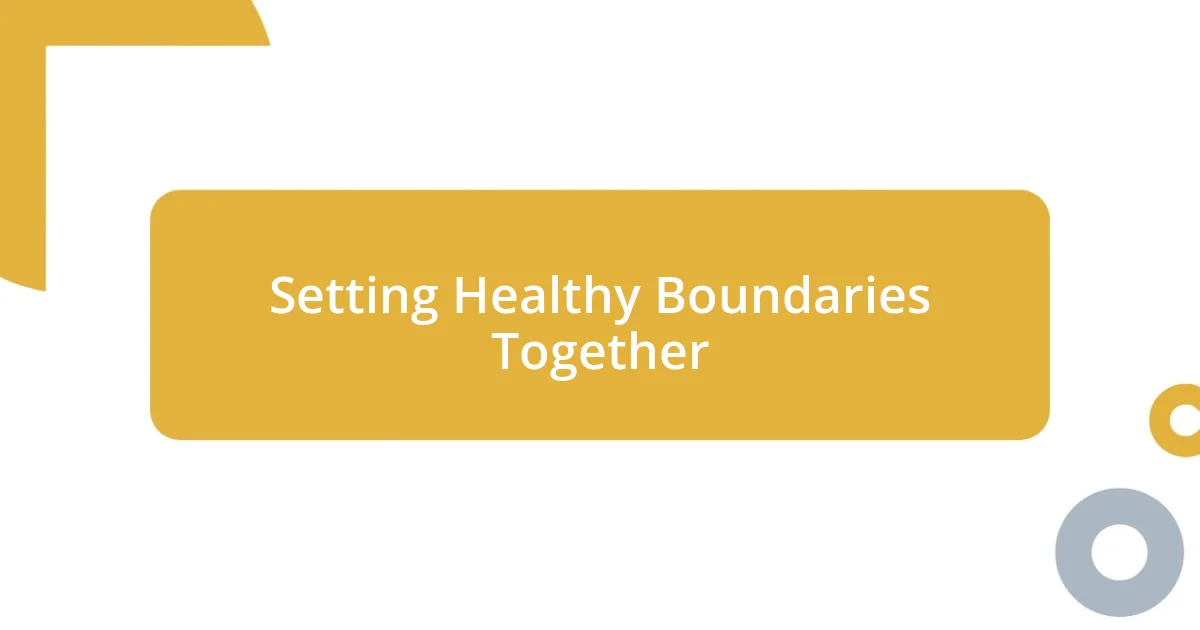
Setting Healthy Boundaries Together
Establishing healthy boundaries together is a crucial element in any relationship I’ve nurtured. I recall a situation with a close friend where we had a candid conversation about our limits regarding time and personal space. It felt liberating to express and listen to each other’s needs, ultimately creating a mutual understanding that allowed our friendship to grow stronger.
One of the most helpful strategies I’ve adopted is having regular check-ins where we can discuss how we’re feeling about our boundaries. During one of these conversations with my partner, I discovered that while I cherished our time together, I also needed some solo time to recharge. This revelation brought us closer, as it opened the door to understanding that wanting space doesn’t mean I value them less. Have you ever felt the weight lift from simply articulating your needs?
Additionally, respecting each other’s boundaries in everyday situations can significantly enhance trust. I remember a time when I accidentally crossed a boundary by making assumptions about my sibling’s free time. When we sat down to clarify this, not only did we resolve the misunderstanding, but we also reinforced our commitment to respecting one another’s limits. It struck me how even minor boundaries, when acknowledged, can have a profound influence on the health of our relationships. How often do we overlook these little details, only to realize later the impact they can have?
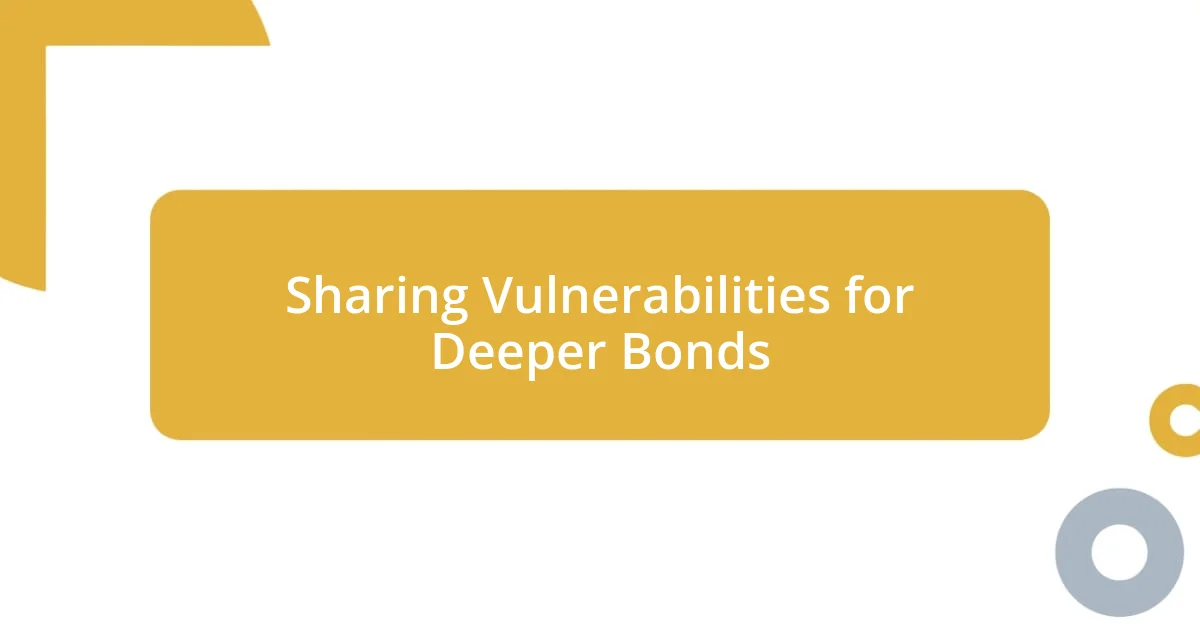
Sharing Vulnerabilities for Deeper Bonds
Opening up about vulnerabilities can be incredibly transformative. I remember a moment with a new friend when I shared my struggles with anxiety. I hadn’t intended to dive deep, but something about the conversation felt safe, so I did. To my surprise, they reciprocated by sharing their own experiences. That exchange brought us closer together, creating an unspoken bond that went beyond surface level.
Vulnerability often invites empathy and understanding. I’ve experienced this firsthand during a period of professional uncertainty. When I confided in a colleague about my fears of failing, they didn’t just listen; they shared their own stories of setbacks and triumphs. It made me realize that when we allow ourselves to be seen, others feel encouraged to do the same. Isn’t it fascinating how shared struggles can often unite us, breaking down barriers that keep our relationships superficial?
I’ve also realized that expressing vulnerabilities doesn’t always feel easy. It comes with a level of risk, and I’ve had moments when I hesitated, fearing judgment. Yet, those times when I took that leap—like during an intimate gathering with friends—my honesty led to deeper conversations. It’s in those raw moments that I’ve found the most genuine connections. Have you experienced that kind of depth in your own relationships? It’s a powerful reminder of how vulnerability can be the cornerstone of true intimacy.
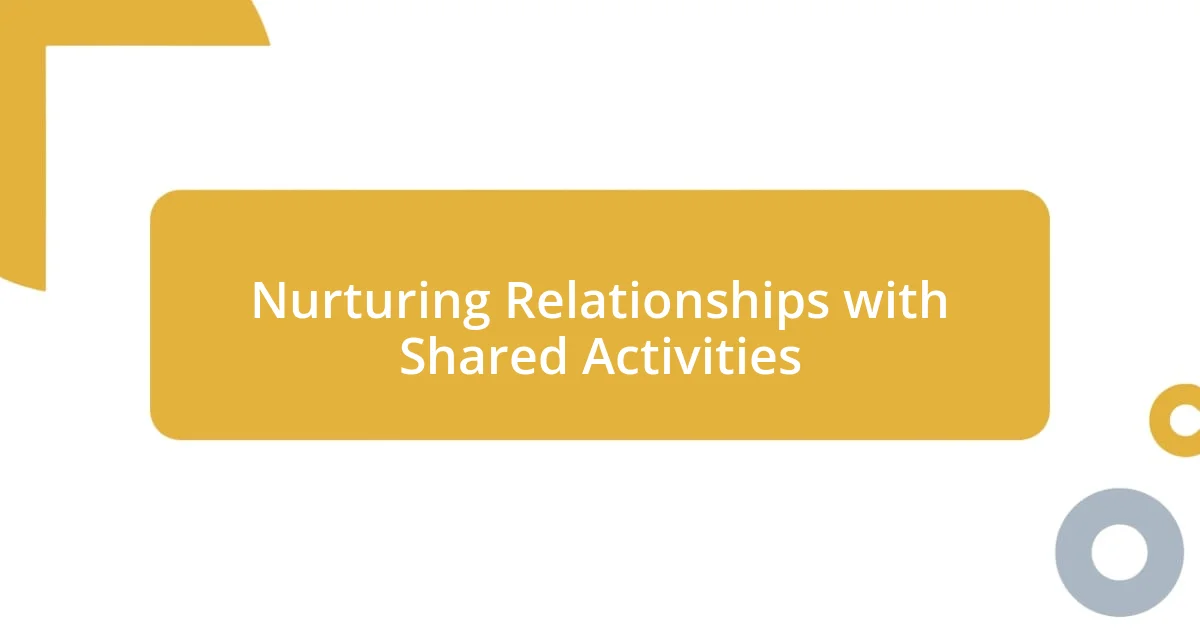
Nurturing Relationships with Shared Activities
Engaging in shared activities is a delightful way to nurture new relationships. I vividly recall my first hiking trip with a new acquaintance. It started as an ordinary day, but as we navigated the trails, the laughter and shared sights fostered camaraderie. There’s something magical about experiencing nature together; it becomes more memorable when you can point out a rare bird or encourage each other to tackle a steep incline. Do you remember a time when a simple activity deepened your connection with someone?
Cooking together is another favorite practice of mine. I once invited a new colleague over for a casual dinner, and as we chopped vegetables and concocted a meal, our conversation flowed effortlessly. It felt like we were sharing not just ingredients, but also fragments of our lives. The kitchen became our little sanctuary, allowing us to bond over tastes, preferences, and shared laughter about our culinary mishaps. Isn’t it interesting how food can create a bridge between hearts?
Lastly, I believe that trying out new hobbies together can cultivate strong bonds. I distinctly remember taking a pottery class with a friend I was getting to know. We fumbled with clay, creating absurd shapes, but honestly, the fun we had was what mattered most. Those moments of lightheartedness helped us build trust and understanding, reminding me that cultivating a relationship doesn’t always require grand gestures—sometimes, it’s the simple act of trying something new by each other’s side that truly nurtures a connection. Isn’t it fascinating how a shared experience can serve as a foundation for growth?
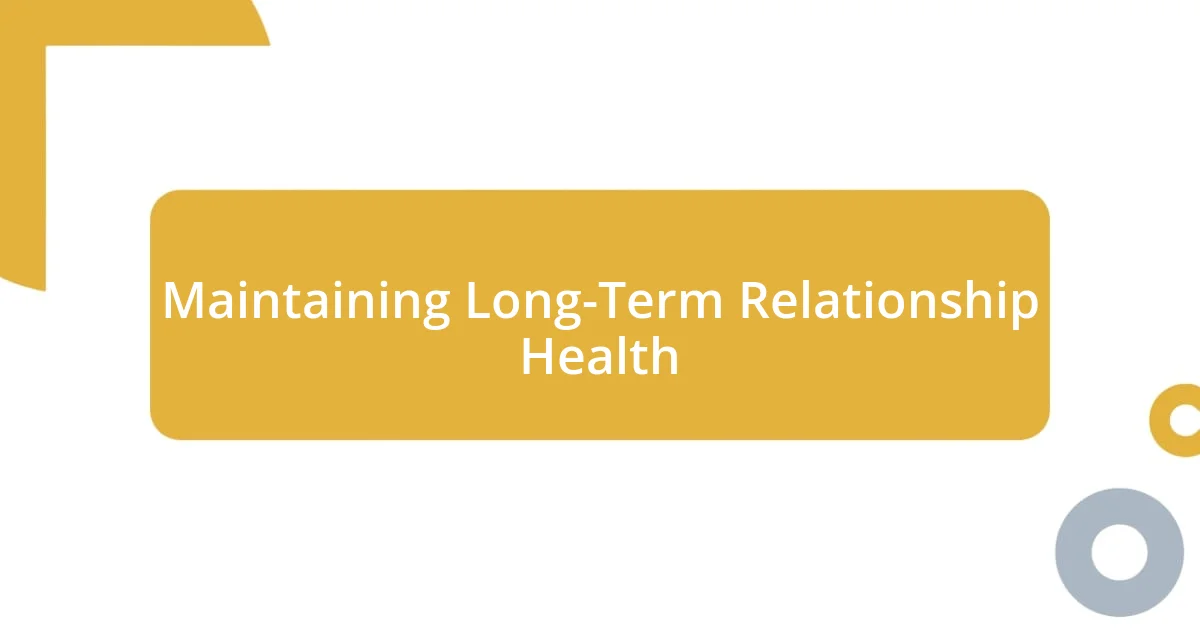
Maintaining Long-Term Relationship Health
Maintaining the health of long-term relationships requires consistent effort and care. I find that regular check-ins are essential; there’s something deeply reassuring about setting aside time to talk. I once made it a point to have monthly chats with a close friend where we exchanged thoughts about our lives. Those sessions helped us navigate challenges, share joys, and ensure we remained on the same page, reinforcing the bond we had formed.
Trust is another cornerstone of a lasting relationship. A while back, I had a conflict with a partner because we both felt unheard. It was during a difficult day that we decided to talk it out, openly voicing our feelings. By honestly addressing our perspectives, we not only resolved the disagreement but also grew closer through the experience. Have you ever found that facing conflicts directly can actually deepen your connections in unexpected ways?
Lastly, expressing gratitude in small yet meaningful ways can keep the spark alive. I vividly remember setting aside little notes of appreciation for my partner. Just a simple “thank you for being you” can bring a smile and remind them of their worth in your life. I’ve learned that these gestures don’t have to be grand; even the tiniest acts can make a significant impact. Don’t you think it’s those little moments of kindness that layer richness into our relationships over time?












